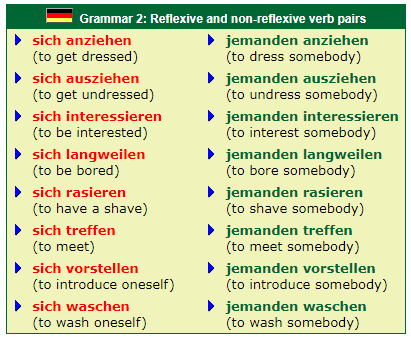Reflexive and non-reflexive verbs
Most of the verbs which we have met on the previous page can either be used as a reflexive verb followed by a reflexive pronoun in the accusative case, or as a normal verb using a personal pronoun in the accusative case. In the second case the action of the verb is being carried out to somebody else.

Notes
1. In dictionaries, verbs which take a direct object are listed as in the table above, namely preceded by jemanden or its abbreviated form jdn.. The word jemand is the German word for somebody. In the accusative case (as here), it adds "-en". To use the verb, simply replac jemanden with the accusative of the noun to which you are referring.
2. Care needs to be taken in distinguishing between the reflexive and non-reflexive usages of a verb:
Claudia wäscht sich.
(Claudia washes herself.)
Claudia wäscht das Kind.
(Claudia washes the child.)
Er stellt sich vor.
(He introduces himself.)
Er stellt ihn vor.
(He introduces him (i.e. somebody else).)
Sie treffen sich.
(They meet each other.)
Sie treffen sie.
(They meet them (i.e. some other people).)
 英语
英语 日语
日语 韩语
韩语 法语
法语 西班牙语
西班牙语 意大利语
意大利语 阿拉伯语
阿拉伯语 葡萄牙语
葡萄牙语 越南语
越南语 俄语
俄语 芬兰语
芬兰语 泰语
泰语 丹麦语
丹麦语 对外汉语
对外汉语

